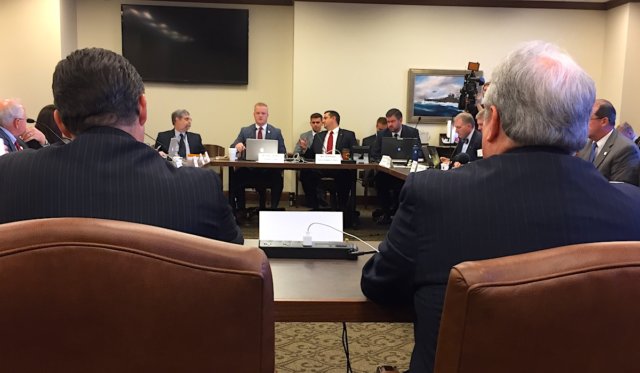
Wearing skull-and-crossbones cuff links and a red string around his wrist as a symbolic protection from misfortune, acting Commissioner of Health Preston Doerflinger testified for more than two hours this morning about the financial scandal that has rocked the Oklahoma State Department of Health and spurred a House Special Investigation Committee’s hearings.
“There’s not a day that I’m there that I’m not angry multiple times a day at what I’m seeing, just as this body should be angry and the governor should be angry and the people of this state should be angry,” Doerflinger told more than a dozen House members on the committee. “It would not be accurate to try to apply what happened at the State Department of Health across the entire enterprise of state government, and I think we all do ourselves an injustice when we do that.”
Doerflinger, who has annually advocated for the Legislature to pass new and recurring revenue in his role as Gov. Mary Fallin’s secretary of finance, attempted to walk that fine line Monday. He reminded lawmakers that state appropriations fund important government services, but he also blasted former Commission of Health Terry Cline’s administration for fostering “agency creep” and severe “bloat.”
“From the moment I got there, it was clear we had bloat in the agency,” Doerflinger said. “The best way to describe this is a situation where many of the revolving funds there have been bastardized to provide resources for operations.”
Responding to a question from Rep. Cyndi Munson (D-OKC) about where state appropriations were going within the Oklahoma State Department of Health, Doerflinger noted that the agency receives dozens of federal grants, later elaborating that there are “70 different funding sources that they use.”
“There is not an agency that is more complex in the way it funds its employees,” Doerflinger said. “It is very much a split-funded situation. Representative, if you worked there, you might be paid by 10 different sources or more of revenue, and that is one of the [causes of this problem].”
Answering a question from Rep. Elise Hall (R-OKC) about whether he believes more “bloat” will be unearthed at the agency, Doerflinger said, “We have to be much more strategic with the way we are going to approach service delivery.
“There are programs or services that have been added where we are currently evaluating return on investment for those programs,” Doerflinger said.
He said programs and services had been expanded over recent years despite falling state appropriations.
“That’s all good and great, I guess, if you have the resources to carry it out and you’re moving the needle,” Doerflinger said. “We need to truly figure out how we bend the needle on some of these health outcomes.”
‘This agency would have defaulted’
Doerflinger was asked repeatedly to elaborate on the $30 million in additional appropriations the Legislature made available in November during its first special session.
“If that was not received, this agency would have defaulted, not just on payroll but on other obligations as well,” Doerflinger said.
Rep. Josh Cockroft (R-Wanette) asked whether any of the $30 million would be used to replenish federal dollars that had been improperly shifted to other funds.
Doerflinger said some would, and that the announced terminations of 198 OSDH employees was still necessary owing to agency bloat and the need to fill funds emptied by past agency mismanagement. He contended that agency services would not be affected by the nearly 200 layoffs, 161 of which will become effective March 3.
‘The level of detail’
Doerflinger was pressed about when he learned about the OSDH financial issues. He said State Auditor and Inspector Gary Jones told him in mid-October that an audit he was conducting had shown other financial problems that could jeopardize the department’s ability to make payroll in November.
Rep. Kevin Calvey (R-OKC) asked a string of yes-or-no questions, indicative of his courtroom experience as a lawyer and an officer in the U.S. Army’s Judge Advocate General office. He pressed Doerflinger — and later acting Office of Management and Enterprise Services acting director Denise Northrup — on whether they had examined OSDH contracts or expenditures while they were approving the agency’s annual budgets.
Doerflinger and Northrup noted that PeopleSoft, the state’s overarching budgeting software, did not show the “supplemental” data managed by OSDH, thus making the agency’s specific accounting of funds invisible to OMES offhand.
“I know there’s been an interest in the past to allow for more visibility into all the sources of revenue an agency may have,” Doerflinger said. “Under the current system, OMES doesn’t see the level of detail that an agency might have within its own agency.”





















